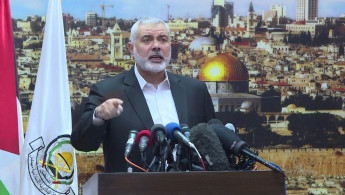Intifada of the Stone: Hamas leader calls for new uprising after Trump's Jerusalem move
In a speech on Thursday, Haniya's address to "the Palestinian people, the Palestinian Authority and the rest of the Arab World" announced the start of a new intifada, due to begin on Friday.
"This intifada will be called the Intifada of the Stone," the leader of the Palestinian movement said, urging that it begins on Friday, a holy day for Muslims.
He described Trump's decision as an "aggression on our people and a war on our safety."
Haniya described Trump as an oppressor and demanded that Arab states boycott America while it continues to violate Palestinian rights and sovereignty.
He also denounced the Palestinian-Israeli peace process, which analysts say has been killed by the Trump move.
Hamas on Saturday warned that an intifada would be announced should Trump make the move.
"We warn against such a move and call on the Palestinian people to revive the intifada if these unjust decisions on Jerusalem are adopted," Hamas said in a statement.
Any decision to move its embassy there would be "a flagrant attack on the city by the American administration" and give Israel "a cover for continuing its crime of Judaising the city and emptying it of Palestinians," the leader said.
Trump's move ends seven decades of US ambiguity on the status of the Holy City, which is vociferously claimed by both Israelis and Palestinians, and his decision immediately caused a stir with US allies who condemned the move.
Saudi Arabia blasted the move as "unjustified and irresponsible", and said it goes against the "historical and permanent rights of the Palestinian people."
Through gritted teeth, Britain described the move as "unhelpful" and France called it "regrettable." Germany said plainly that it "does not support" Trump's decision.
Eight countries including Britain, France and Italy pressed for an emergency meeting of the UN Security Council in response to the move, which was set for Friday.
The leaders of Muslim nations meanwhile deployed ever-harsher rhetoric to describe Trump's decision.
Turkey and Iran, both vying for regional influence, tried to give voice to the anger felt by many across the Muslim world.
Ankara called the decision "irresponsible" and illegal. Tehran said it would "provoke Muslims and inflame a new intifada."





 Follow the Middle East's top stories in English at The New Arab on Google News
Follow the Middle East's top stories in English at The New Arab on Google News
![The UAE is widely suspected of arming the RSF militia [Getty]](/sites/default/files/styles/image_330x185/public/2024-11/GettyImages-472529908.jpg?h=69f2b9d0&itok=Yauw3YTG)
![Netanyahu furiously denounced the ICC [Getty]](/sites/default/files/styles/image_330x185/public/2024-11/GettyImages-2169352575.jpg?h=199d8c1f&itok=-vRiruf5)
![Both Hamas and the Palestinian Authority welcomed the ICC arrest warrants [Getty]](/sites/default/files/styles/image_330x185/public/2024-11/GettyImages-2178351173.jpg?h=199d8c1f&itok=TV858iVg)